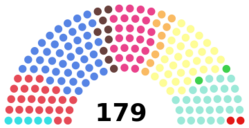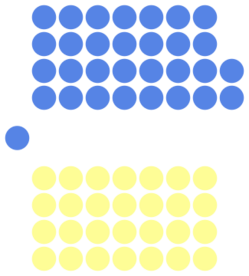Federal Diet (Erishlands)
This article is incomplete because it is pending further input from participants, or it is a work-in-progress by one author. Please comment on this article's talk page to share your input, comments and questions. Note: To contribute to this article, you may need to seek help from the author(s) of this page. |
Realm Diet Rejcesdagen | |
|---|---|
| Type | |
| Type | |
| Houses | Landething Folkthing |
| History | |
| Founded | 3 January 1833 |
| Leadership | |
Speaker of the Landething | Þórsten Wang, Democratic since 3 January 2020 |
President of the Folkthing | Ulle Næsz, Democratic since 3 January 2020 |
| Structure | |
| Seats | 238 (179 Representatives; 59 Senators) |
 | |
Landething political groups | Government (68)
Opposition (59)
Independents (51)
|
 | |
Folkthing political groups | Government (31)
Opposition (28)
|
| Elections | |
Landething voting system | Closed list proportional representation |
Folkthing voting system | Two-party proportional runoff |
Last election | 20 December 2019 |
Next election | 19 December 2023 |
| Meeting place | |
| Rikthing House Serstead Erishland | |
The Realm Diet (Erish: Rejcesdagen [ˈriːt͡ʃʰəs̪ˈð̞ɑːɣ̞n̩]) is the federal parliament of the Erishlands. It is the only federal institution that is directly elected. Because of the participation of the Confederal Council in the federal legislative process, it functions similarly to a lower house in other democracies. The Realm Diet is established by Article IV, Chapter 1 of the Constitution of the Erish Confederation (Erish: Grundlogo Ärscbondem), which lays out its composition and powers. The Realm Diet meets in the Realm Diet House (Erish: Rejcesdagshowseđ) in Fzorzborg. As of 3 January 2021, the presiding officer, the Speaker of the Realm Diet, is Representative Yursten Wang.
Erish citizens elect the entire Realm Diet every four years. The number of seats in the Realm Diet is set by the cubic root of the overall population as determined by the federal census, with the current Realm Diet having 277 seats. 208 of these seats belong to Representatives, and are apportioned to the states based upon their population and elected by dual-mandate voting, where each constituency is represented by two Representatives. The first Representative is elected by winning the most votes, whilst the second seat is awarded so that a state's overall party representation is proportional. The remaining 69 seats belong to Senators and are elected through a national two-round proportional vote; the first vote guarantees seats to the two parties that receive the most votes, and the second vote determines their share of seats. Midterm elections for the Realm Diet can only be called over deadlocked legislation, and the elected Representatives and Senators only serve out the remainder of the four-year term.
The Realm Diet has several functions. As the federal legislature, it creates laws on areas of federal jurisdiction, but the Constitution also empowers it to legislate on certain areas of state jurisdiction. Such federally-created state laws, however, require the consent of the Confederal Council, thus establishing the two bodies in a relationship similar to the houses of a bicameral parliament. The Realm Diet itself partially functions like a bicameral legislature; only Senators can participate in a vote of no confidence, whilst only Representatives can vote on military deployments, judiciary legislation, impeachments, or redistricting.